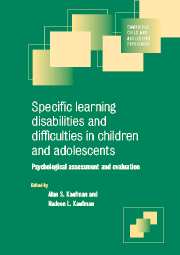 Specific Learning Disabilities and Difficulties in Children and Adolescents
Specific Learning Disabilities and Difficulties in Children and Adolescents from Part II - Alternative Cognitive Approaches to Learning Disabilities Assessment and Remediation
Published online by Cambridge University Press: 06 January 2010
This chapter provides a context in which to understand how two instruments developed by Alan and Nadeen Kaufman may be utilized in the diagnosis and treatment of learning disabilities. The theoretical underpinnings of both of the measures are described, as well as the process of their development and standardization. To clarify how these instruments may be applied to the diagnosis and treatment of learning disabilities, case studies are presented. The Kaufman Assessment Battery for Children (K-ABC, Kaufman & Kaufman, 1983) and the Kaufman Adolescent and Adult Intelligence Test (KAIT; Kaufman & Kaufman, 1993) are the two featured intelligence tests.
History, development, and goals of the K-ABC and KAIT
In development of their two tests of intelligence, the K-ABC and the KAIT, the Kaufmans stepped away from the common conception of intelligence as an overall global entity (known as g). Both of the batteries were developed with the intention of improving upon existing individually administered tests of intelligence. Unlike the Wechsler tests, both the K-ABC and the KAIT were developed on the basis of neuropsychological theories and theories of cognitive psychology, as well as on the basis of available research.
K-ABC theory and development
The K-ABC is based on a theory of sequential and simultaneous information processing.
To save this book to your Kindle, first ensure [email protected] is added to your Approved Personal Document E-mail List under your Personal Document Settings on the Manage Your Content and Devices page of your Amazon account. Then enter the ‘name’ part of your Kindle email address below. Find out more about saving to your Kindle.
Note you can select to save to either the @free.kindle.com or @kindle.com variations. ‘@free.kindle.com’ emails are free but can only be saved to your device when it is connected to wi-fi. ‘@kindle.com’ emails can be delivered even when you are not connected to wi-fi, but note that service fees apply.
Find out more about the Kindle Personal Document Service.
To save content items to your account, please confirm that you agree to abide by our usage policies. If this is the first time you use this feature, you will be asked to authorise Cambridge Core to connect with your account. Find out more about saving content to Dropbox.
To save content items to your account, please confirm that you agree to abide by our usage policies. If this is the first time you use this feature, you will be asked to authorise Cambridge Core to connect with your account. Find out more about saving content to Google Drive.